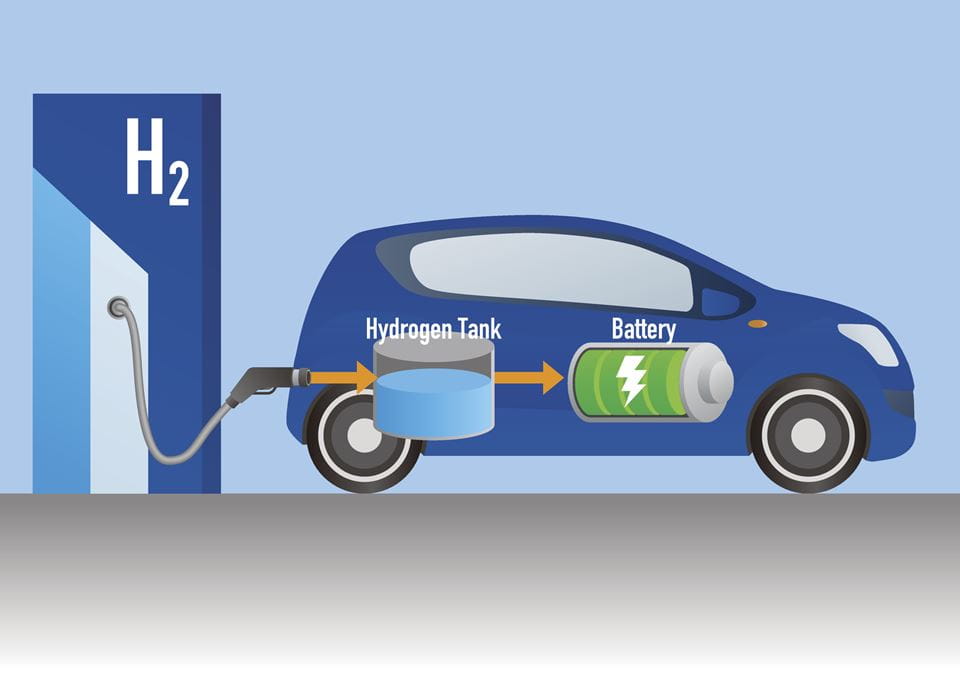
Hydrogen cars – a never-ending promise or a change on the horizon?
When you hear the term 'hydrogen car', you probably think of futuristic, state-of-the-art technology. That's not entirely true. The operating principle behind the fuel cell that powers today's hydrogen cars was invented in 1838 by Swiss scientist Christian Friedrich Schönbein, and NASA has been using the technology for manned space flight since the 1960s. But what's the current situation when it comes to using the technology – and in vehicles in particular?

How does it work?
Hydrogen is stored in the car's hydrogen tank. The hydrogen is transferred from the hydrogen tank to the fuel cell, where a chemical reaction takes place between the hydrogen and oxygen from the air. This reaction produces electricity and water vapour, and the electricity generated is used to power the electric motor. On a fundamental level, hydrogen cars or fuel cell electric vehicles (FCEVs) are electric cars that produce their own electricity, with water vapour being the only residual product. This is, of course, great from an environmental perspective. What's more, you don't need to plug it in as you do with battery electric vehicles; you can simply fill up with hydrogen. This takes about five minutes and is comparable to LPG tanks. The distance you can travel with hydrogen cars is also competitive, being similar to current petrol and diesel cars.
Taxation
From a tax perspective, FCEVs benefit from the same favourable scheme as battery electric vehicles (BEVs). A hydrogen car is an electric car and therefore enjoys the same taxation conditions as a BEV. Since 1 January 2020, the costs of fully electric cars have been 100% tax-deductible – and the same applies to hydrogen cars.
Promising, but not widely available
Driving an electric car with the convenience of a normal car with an internal combustion engine, tax breaks and more all sounds well and good, but FCEVs have not been a great commercial success up to now. Since 2013, less than 8,000 have been sold worldwide, while the range of hydrogen cars on the market is rather limited and very expensive: only the Hyundai Nexo (€67,768 excluding VAT) and the Toyota Mirai (€66,033 excluding VAT) are available in Belgium. Most other manufacturers have put their development on hold and are currently focusing on battery electric vehicles (BEVs), plug-in hybrid electric vehicles (PHEVs) and full hybrids.
Safety
When it comes to safety, hydrogen cars are just as safe as those that run on conventional fuel. Filling up is also a safe process, and refuelling stations must meet strict conditions. The hydrogen cars currently on the market have all gone through the car manufacturers' full development cycle, including crash tests, and are approved for use on the road.
Network infrastructure needs to be improved
And then there's the network infrastructure. At present, there are only two hydrogen stations in Belgium – one in Zaventem and one in Halle. Another station is planned for Wilrijk in 2021. Above all, however, there seems to be a lack of political will when it comes to infrastructure, as this is something that could be developed quickly if action were taken by the government. Belgium has an important factor in its favour: it lies only 613 kilometres from hydrogen pipelines, with hubs around the ports of Ghent and Antwerp. As a result, the further roll-out of hydrogen stations must surely be possible.
Faced with a lack of initiatives from the government, a number of manufacturers and suppliers have taken matters into their own hands. Toyota, Daimler, Honda, Hyundai and the BMW Group have joined forces with other companies such as Shell and Total as part of the Hydrogen Council. This partnership wants to invest heavily in technology and infrastructure in the coming years, with expanding the number of refuelling stations being one of its priorities. Another priority is to look at the way in which hydrogen is produced, as this can be done in both an environmentally friendly (wind and solar power) and a less environmentally friendly (e.g. natural gas) manner.
What does the future hold?
Hydrogen cars have many things going in their favour, but the reality is that they are not a viable solution at this time. The limited network of hydrogen refuelling stations and not enough affordable hydrogen cars present a barrier to them being a commercial success for the time being. It is a vicious circle that can only be broken by joint ventures between car manufacturers and energy suppliers, or government incentives to focus on increasing the number of hydrogen refuelling stations, as is the case in other countries.
Once these challenges have been overcome, hydrogen cars will complement the current range of battery electric vehicles, present a sustainable alternative to diesel cars and offer a solution for users who do not have sufficient charging opportunities. With a mixture of hydrogen cars and battery electric vehicles, we would then be taking another step towards sustainable mobility when it comes to cars.


